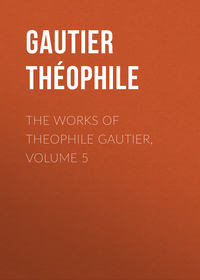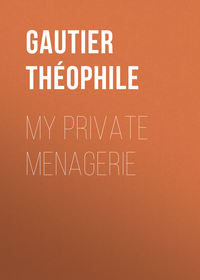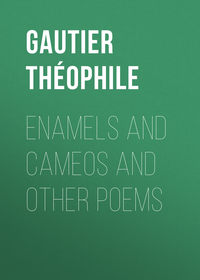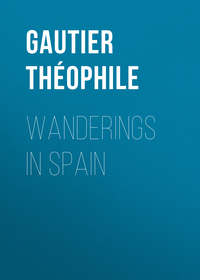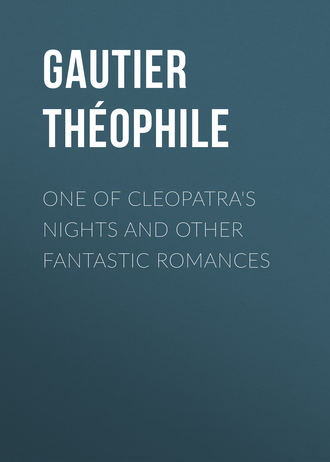 полная версия
полная версияOne of Cleopatra's Nights and Other Fantastic Romances
"Menacing and funereal symbols alone meet the eye – the emblems of the pedum, the tau, allegorical globes, coiling serpents, and the scales in which souls are weighed – the Unknown, death, nothingness. In the place of any vegetation only stelæ limned with weird characters; instead of avenues of trees, avenues of granite obelisks; in lieu of soil, vast pavements of granite for which whole mountains could each furnish but one slab; in place of a sky, ceilings of granite – eternity made palpable, a bitter and everlasting sarcasm upon the frailty and brevity of life – stairways built only for the limbs of Titans, which the human foot cannot ascend save by the aid of ladders; columns that a hundred arms cannot encircle; labyrinths in which one might travel for years without discovering the termination – the vertigo of enormity, the drunkenness of the gigantic, the reckless efforts of that pride which would at any cost engrave its name deeply upon the face of the world.
"And, moreover, Charmion, I tell you a thought haunts me which terrifies me. In other lands of the earth, corpses are burned, and their ashes soon mingle with the soil. Here, it is said that the living have no other occupation than that of preserving the dead. Potent balms save them from destruction; the remains endure after the soul has evaporated. Beneath this people lie twenty peoples; each city stands upon twenty layers of necropoli; each generation which passes away leaves a population of mummies to a shadowy city. Beneath the father you find the grandfather and the great-grandfather in their gilded and painted boxes, even as they were during life; and should you dig down forever, forever you would still find the underlying dead.
"When I think upon those bandage-swathed myriads – those multitudes of parched spectres who fill the sepulchral pits, and who have been there for two thousand years face to face in their own silence, which nothing ever breaks, not even the noise which the graveworms make in crawling, and who will be found intact after yet another two thousand years, with their crocodiles, their cats, their ibises, and all things that lived in their lifetime – then terrors seize me, and I feel my flesh creep. What do they mutter to each other? For they still have lips, and every ghost would find its body in the same state as when it quitted it, if they should all take the fancy to return.
"Ah, truly is Egypt a sinister kingdom and little suited to me, the laughter-loving and merry one. Everything in it encloses a mummy; that is the heart and the kernel of all things. After a thousand turns you must always end there; the Pyramids themselves hide sarcophagi. What nothingness and madness is this! Disembowel the sky with gigantic triangles of stone – you cannot thereby lengthen your corpse an inch. How can one rejoice and live in a land like this, where the only perfume you can respire is the acrid odor of the naphtha and bitumen which boil in the caldrons of the embalmers, where the very flooring of your chamber sounds hollow because the corridors of the hypogea and the mortuary pits extend even under your alcove? To be the queen of mummies, to have none to converse with but statues in constrained and rigid attitudes – this is, in truth, a cheerful lot. Again, if I only had some heartfelt passion to relieve this melancholy, some interest in life; if I could but love somebody or something; if I were even loved; but I am not.
"This is why I am weary, Charmion. With love, this grim and arid Egypt would seem to me fairer than even Greece with her ivory gods, her temples of snowy marble, her groves of laurel, and fountains of living water. There I should never dream of the weird face of Anubis and the ghastly terrors of the cities underground."
Charmion smiled incredulously. "That ought not, surely, to be a source of much grief to you, O queen; for every glance of your eyes transpierces hearts, like the golden arrows of Eros himself."
"Can a queen," answered Cleopatra, "ever know whether it is her face or her diadem that is loved? The rays of her starry crown dazzle the eyes and the heart. Were I to descend from the height of my throne, would I even have the celebrity or the popularity of Bacchis or Archianassa, of the first courtesan from Athens or Miletus? A queen is something so far removed from men, so elevated, so widely separated from them, so impossible for them to reach! What presumption dare flatter itself in such an enterprise? It is not simply a woman, it is an august and sacred being that has no sex, and that is worshipped kneeling without being loved. Who was ever really enamoured of Hera the snowy-armed or Pallas of the sea-green eyes? Who ever sought to kiss the silver feet of Thetis or the rosy fingers of Aurora? What lover of the divine beauties ever took unto himself wings that he might soar to the golden palaces of heaven? Respect and fear chill hearts in our presence, and in order to obtain the love of our equals, one must descend into those necropoli of which I have just been speaking."
Although she offered no further objection to the arguments of her mistress, a vague smile which played about the lips of the handsome Greek slave showed that she had little faith in the inviolability of the royal person.
"Ah," continued Cleopatra, "I wish that something would happen to me, some strange, unexpected adventure. The songs of the poets; the dances of the Syrian slaves; the banquets, rose garlanded, and prolonged into the dawn; the nocturnal races; the Laconian dogs; the tame lions; the hump-backed dwarfs; the brotherhood of the Inimitables; the combats of the arena; the new dresses; the byssus robes; the clusters of pearls; the perfumes from Asia; the most exquisite of luxuries; the wildest of splendors – nothing any longer gives me pleasure. Everything has become indifferent to me, everything is insupportable to me."
"It is easily to be seen," muttered Charmion to herself, "that the queen has not had a lover nor had anyone killed for a whole month."
Fatigued with so lengthy a tirade, Cleopatra once more took the cup placed beside her, moistened her lips with it, and putting her head beneath her arm, like a dove putting its head under its wing, composed herself for slumber as best she could. Charmion unfastened her sandals and commenced to gently tickle the soles of her feet with a peacock's feather, and Sleep soon sprinkled his golden dust upon the beautiful eyes of Ptolemy's sister.
While Cleopatra sleeps, let us ascend upon deck and enjoy the glorious sunset view. A broad band of violet color, warmed deeply with ruddy tints toward the west, occupies all the lower portion of the sky; encountering the zone of azure above, the violet shade melts into a clear lilac, and fades off through half-rosy tints into the blue beyond; afar, where the sun, red as a buckler fallen from the furnace of Vulcan, casts his burning reflection, the deeper shades turn to pale citron hues, and glow with turquoise tints. The water, rippling under an oblique beam of light, shines with the dull gleam of the quicksilvered side of a mirror, or like a damascened blade. The sinuosities of the bank, the reeds, and all objects along the shore are brought out in sharp black relief against the bright glow. By the aid of this crepuscular light you may perceive afar off, like a grain of dust floating upon quicksilver, a little brown speck trembling in the network work of luminous ripples. Is it a teal diving, a tortoise lazily drifting with the current, a crocodile raising the tip of his scaly snout above the water to breathe the cooler air of evening, the belly of a hippopotamus gleaming amidstream, or perhaps a rock left bare by the falling of the river? For the ancient Opi-Mou, Father of Waters, sadly needs to replenish his dry urn from the solstitial rains of the Mountains of the Moon.
It is none of these. By the atoms of Osiris so deftly resewn together, it is a man, who seems to walk, to skate, upon the water! Now the frail bark which sustains him becomes visible, a very nutshell of a boat, a hollow fish; three strips of bark fitted together (one for the bottom and two for the sides), and strongly fastened at either end by cord well smeared with bitumen. The man stands erect, with one foot on either side of this fragile vessel, which he impels with a single oar that also serves the purpose of a rudder; and although the royal cangia moves rapidly under the efforts of the fifty rowers, the little black bark visibly gains upon it.
Cleopatra desired some strange adventure, something wholly unexpected. This little bark which moves so mysteriously seems to us to be conveying an adventure, or, at least, an adventurer. Perhaps it contains the hero of our story; the thing is not impossible.
At any rate he was a handsome youth of twenty, with hair so black that it seemed to own a tinge of blue, a skin blonde as gold, and a form so perfectly proportioned that he might have been taken for a bronze statue by Lysippus. Although he had been rowing for a very long time he betrayed no sign of fatigue, and not a single drop of sweat bedewed his forehead.
The sun half sank below the horizon, and against his broken disk figured the dark silhouette of a far distant city, which the eye could not have distinguished but for this accidental effect of light. His radiance soon faded altogether away, and the stars, fair night-flowers of heaven, opened their chalices of gold in the azure of the firmament. The royal cangia, closely followed by the little bark, stopped before a huge marble stairway, whereof each step supported one of those sphinxes that Cleopatra so much detested. This was the landing-place of the summer palace.
Cleopatra, leaning upon Charmion, passed swiftly, like a gleaming vision, between a double line of lantern-bearing slaves.
The youth took from the bottom of his little boat a great lion-skin, threw it across his shoulders, drew the tiny shell upon the beach, and wended his way toward the palace.
CHAPTER III
Who is this young man, balancing himself upon a fragment of bark, who dares follow the royal cangia, and is able to contend in a race of speed against fifty strong rowers from the land of Kush, all naked to to the waist, and anointed with palm-oil? What secret motive urges him to this swift pursuit? That, indeed, is one of the many things we are obliged to know in our character of the intuition-gifted poet, for whose benefit all men, and even all women (a much more difficult matter), must have in their breasts that little window which Momus of old demanded.
It is not a very easy thing to find out precisely what a young man from the land of Kemi, who followed the barge of Cleopatra, queen and goddess Evergetes, on her return from the Mammisi of Hermonthis two thousand years ago, was then thinking of. But we shall make the effort notwithstanding.
Meïamoun, son of Mandouschopsh, was a youth of strange character; nothing by which ordinary minds are affected made any impression upon him. He seemed to belong to some loftier race, and might well have been regarded as the offspring of some divine adultery. His glance had the steady brilliancy of a falcon's gaze, and a serene majesty sat on his brow as upon a pedestal of marble; a noble pride curled his upper lip, and expanded his nostrils like those of a fiery horse. Although owning a grace of form almost maidenly in its delicacy, and though the bosom of the fair and effeminate god Dionysos was not more softly rounded or smoother than his, yet beneath this soft exterior were hidden sinews of steel and the strength of Hercules – a strange privilege of certain antique natures to unite in themselves the beauty of woman with the strength of man.
As for his complexion, we must acknowledge that it was of a tawny orange color, a hue little in accordance with our white-and-rose ideas of beauty; but which did not prevent him from being a very charming young man, much sought after by all kinds of women – yellow, red, copper-colored, sooty-black, or golden skinned, and even by one fair, white Greek.
Do not suppose from this that Meïamoun's lot was altogether enviable. The ashes of aged Priam, the very snows of Hippolytus, were not more insensible or more frigid; the young white-robed neophyte preparing for the initiation into the mysteries of Isis led no chaster life; the young maiden benumbed by the icy shadow of her mother was not more shyly pure.
Nevertheless, for so coy a youth, the pleasures of Meïamoun were certainly of a singular nature. He would go forth quietly some morning with his little buckler of hippopotamus hide, his harpe or curved sword, a triangular bow, and a snake-skin quiver filled with barbed arrows; then he would ride at a gallop far into the desert, upon his slender-limbed, small-headed, wild-maned mare, until he could find some lion-tracks. He especially delighted in taking the little lion-cubs from underneath the belly of their mother. In all things he loved the perilous or the unachievable. He preferred to walk where it seemed impossible for any human being to obtain a foothold, or to swim in a raging torrent, and he had accordingly chosen the neighborhood of the cataracts for his bathing place in the Nile. The Abyss called him!
Such was Meïamoun, son of Mandouschopsh.
For some time his humors had been growing more savage than ever. During whole months he buried himself in the Ocean of Sands, returning only at long intervals. Vainly would his uneasy mother lean from her terrace and gaze anxiously down the long road with tireless eyes. At last, after weary waiting, a little whirling cloud of dust would become visible in the horizon, and finally the cloud would open to allow a full view of Meïamoun, all covered with dust, riding upon a mare gaunt as a wolf, with red and bloodshot eyes, nostrils trembling, and huge scars along her flanks – scars which certainly were not made by spurs.
After having hung up in his room some hyena or lion skin, he would start off again.
And yet no one might have been happier than Meïamoun. He was beloved by Nephthe, daughter of the priest Afomouthis, and the loveliest woman of the Nome Arsinoïtes. Only such a being as Meïamoun could have failed to see that Nephthe had the most charmingly oblique and indescribably voluptuous eyes, a mouth sweetly illuminated by ruddy smiles, little teeth of wondrous whiteness and transparency, arms exquisitely round, and feet more perfect than the jasper feet of the statue of Isis. Assuredly there was not a smaller hand nor longer hair than hers in all Egypt. The charms of Nephthe could have been eclipsed only by those of Cleopatra. But who could dare to dream of loving Cleopatra? Ixion, enamoured of Juno, strained only a cloud to his bosom, and must forever roll the wheel of his punishment in hell.
It was Cleopatra whom Meïamoun loved.
He had at first striven to tame this wild passion; he had wrestled fiercely with it; but love cannot be strangled even as a lion is strangled, and the strong skill of the mightiest athlete avails nothing in such a contest. The arrow had remained in the wound, and he carried it with him everywhere. The radiant and splendid image of Cleopatra, with her golden-pointed diadem and her imperial purple, standing above a nation on their knees, illumined his nightly dreams and his waking thoughts. Like some imprudent man who has dared to look at the sun and forever thereafter beholds an impalpable blot floating before his eyes, so Meïamoun ever beheld Cleopatra. Eagles may gaze undazzled at the sun, but what diamond eye can with impunity fix itself upon a beautiful woman, a beautiful queen?
He commenced at last to spend his life in wandering about the neighborhood of the royal dwelling, that he might at least breathe the same air as Cleopatra, that he might sometimes kiss the almost imperceptible print of her foot upon the sand (a happiness, alas! rare indeed). He attended the sacred festivals and panegyreis, striving to obtain one beaming glance of her eyes, to catch in passing one stealthy glimpse of her loveliness in some of its thousand varied aspects. At other moments, filled with sudden shame of this mad life, he gave himself up to the chase with redoubled ardor, and sought by fatigue to tame the ardor of his blood and the impetuosity of his desires.
He had gone to the panegyris of Hermonthis, and, in the vague hope of beholding the queen again for an instant as she disembarked at the summer palace, had followed her cangia in his boat – little heeding the sharp stings of the sun – through a heat intense enough to make the panting sphinxes melt in lava-sweat upon their reddened pedestals.
And then he felt that the supreme moment was nigh, that the decisive instant of his life was at hand, and that he could not die with his secret in his breast.
It is a strange situation truly to find one-self enamoured of a queen. It is as though one loved a star; yet she, the star, comes forth nightly to sparkle in her place in heaven. It is a kind of mysterious rendezvous. You may find her again, you may see her; she is not offended at your gaze. Oh, misery! to be poor, unknown, obscure, seated at the very foot of the ladder, and to feel one's heart breaking with love for something glittering, solemn, and magnificent – for a woman whose meanest female attendant would scorn you! – to gaze fixedly and fatefully upon one who never sees you, who never will see you; one to whom you are no more than a ripple on the sea of humanity, in nowise differing from the other ripples, and who might a hundred times encounter you without once recognizing you; to have no reason to offer should an opportunity for addressing her present itself in excuse for such mad audacity – neither poetical talent, nor great genius, nor any superhuman qualification – nothing but love; and to be able to offer in exchange for beauty, nobility, power, and all imaginable splendor only one's passion and one's youth – rare offerings, forsooth!
Such were the thoughts which overwhelmed Meïamoun. Lying upon the sand, supporting his chin on his palms, he permitted himself to be lifted and borne away by the inexhaustible current of reverie; he sketched out a thousand projects, each madder than the last. He felt convinced that he was seeking after the unattainable, but he lacked the courage to frankly renounce his undertaking, and a perfidious hope came to whisper some lying promises in his ear.
"Athor, mighty goddess," he murmured in a deep voice, "what evil have I done against thee that I should be made thus miserable? Art thou avenging thyself for my disdain of Nephthe, daughter of the priest Afomouthis? Hast thou afflicted me thus for having rejected the love of Lamia, the Athenian hetaira, or of Flora, the Roman courtesan? Is it my fault that my heart should be sensible only to the matchless beauty of thy rival, Cleopatra? Why hast thou wounded my soul with the envenomed arrow of unattainable love? What sacrifice, what offerings dost thou desire? Must I erect to thee a chapel of the rosy marble of Syene with columns crowned by gilded capitals, a ceiling all of one block, and hieroglyphics deeply sculptured by the best workmen of Memphis and of Thebes? Answer me."
Like all gods or goddesses thus invoked, Athor answered not a word, and Meïamoun resolved upon a desperate expedient.
Cleopatra, on her part, likewise invoked the goddess Athor. She prayed for a new pleasure, for some fresh sensation. As she languidly reclined upon her couch she thought to herself that the number of the senses was sadly limited, that the most exquisite refinements of delight soon yielded to satiety, and that it was really no small task for a queen to find means of occupying her time. To test new poisons upon slaves; to make men fight with tigers, or gladiators with each other; to drink pearls dissolved; to swallow the wealth of a whole province all these things had become commonplace! and insipid.
Charmion was fairly at her wit's end, and knew not what to do for her mistress.
Suddenly a whistling sound was heard, and an arrow buried itself, quivering, in the cedar wainscoting of the wall.
Cleopatra well-nigh fainted with terror. Charmion ran to the window, leaned out, and beheld only a flake of foam on the surface of the river. A scroll of papyrus encircled the wood of the arrow. It bore only these words, written in Phœnician characters, "I love you!"
CHAPTER IV
"I love you," repeated Cleopatra, making the serpent-coiling strip of papyrus writhe between her delicate white fingers. "Those, are the words I longed for. What intelligent spirit, what invisible genius has thus so fully comprehended my desire?"
And thoroughly aroused from her languid torpor, she sprang out of bed with the agility of a cat which has scented a mouse, placed her little ivory feet in her embroidered tatbebs, threw a byssus tunic over her shoulders, and ran to the window from which Charmion was still gazing.
The night was clear and calm. The risen moon outlined with huge angles of light and shadow the architectural masses of the palace, which stood out in strong relief against a background of bluish transparency; and the waters of the river, wherein her reflection lengthened into a shining column, were frosted with silvery ripples. A gentle breeze, such as might have been mistaken for the respiration of the slumbering sphinxes, quivered among the reeds and shook the azure bells of the lotus flowers; the cables of the vessels moored to the Nile's banks groaned feebly, and the rippling tide moaned upon the shore like a dove lamenting for its mate. A vague perfume of vegetation, sweeter than that of the aromatics burned in the anschir of the priests of Anubis, floated into the chamber. It was one of those enchanted nights of the Orient, which are more splendid than our fairest days; for our sun can ill compare with that Oriental moon.
"Do you not see far over there, almost in the middle of the river, the head of a man swimming? See, he crosses that track of light, and passes into the shadow beyond! He is already out of sight!" And, supporting herself upon Charmion's shoulder, she leaned out, with half of her fair body beyond the sill of the window, in the effort to catch another glimpse of the mysterious swimmer; but a grove of Nile acacias, dhoum-palms, and sayals flung its deep shadow upon the river in that direction, and protected the flight of the daring fugitive. If Meïamoun had but had the courtesy to look back, he might have beheld Cleopatra, the sidereal queen, eagerly seeking him through the night gloom – he, the poor obscure Egyptian, the miserable lion-hunter.
"Charmion, Charmion, send hither Phrehipephbour, the chief of the rowers, and have two boats despatched in pursuit of that man!" cried Cleopatra, whose curiosity was excited to the highest pitch.
Phrehipephbour appeared, a man of the race of Nahasi, with large hands and muscular arms, wearing a red cap not unlike a Phrygian helmet in form, and clad only in a pair of narrow drawers diagonally striped with white and blue. His huge torso, entirely nude, black and polished like a globe of jet, shone under the lamplight. He received the commands of the queen and instantly retired to execute them.
Two long, narrow boats, so light that the least inattention to equilibrium would capsize them, were soon cleaving the waters of the Nile with hissing rapidity under the efforts of the twenty vigorous rowers, but the pursuit was all in vain. After searching the river banks in every direction, and carefully exploring every patch of reeds, Phrehipephbour returned to the palace, having only succeeded in putting to flight some solitary heron which had been sleeping on one leg, or in troubling the digestion of some terrified crocodile.
So intense was the vexation of Cleopatra at being thus foiled, that she felt a strong inclination to condemn Phrehipephbour either to the wild beasts or to the hardest labor at the grindstone. Happily, Charmion interceded for the trembling unfortunate, who turned pale with fear, despite his black skin. It was the first time in Cleopatra's life that one of her desires had not been gratified as soon as expressed, and she experienced, in consequence, a kind of uneasy surprise; a first doubt, as it were, of her own omnipotence.
She, Cleopatra, wife and sister of Ptolemy – she who had been proclaimed goddess Evergetes, living queen of the regions Above and Below, Eye of Light, Chosen of the Sun (as may still be read within the cartouches sculptured on the walls of the temples) – she to find an obstacle in her path, to have wished aught that failed of accomplishment, to have spoken and not been obeyed! As well be the wife of some wretched Paraschistes, some corpse-cutter, and melt natron in a caldron! It was monstrous, preposterous! and none but the most gentle and clement of queens could have refrained from crucifying that miserable Phrehipephbour.


